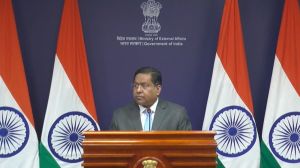Answer time
Why is the opposition so uninterested in Question Hour?
The winter session of Parliament is well into its first week,and familiar battlelines have already been drawn. On Thursday,once again,most business of both Houses was abandoned to adjournments as the opposition parties chose freely from a varied list of demands for discussion price rise,Telangana,black money. And even as they pool their disruptive energies to extract concessions from the government on the modality and scope of the discussions,an irony appears to be lost on them: that by forcing disruptions to gain answers from the government,they are surrendering the one institutional mechanism aimed at holding the government to answers every single day that Parliament is in session: Question Hour.
In a consultative process that has space to accommodate short notice questions that is,bypassing the 10-day notice period Question Hour has enormous potential for the inventive MP. While unstarred questions yield written replies,20 starred questions can be taken up on the floor of the House each day. And once the concerned minister answers the allotted question,the floor is open for supplementary queries,allowing for the teasing out of more information as well as presenting an opportunity to test the preparedness of a member of the Union council of ministers. In shunning this mechanism,the opposition fails to dispense its primary responsibility to keep a check on the government and,perhaps more importantly,of acting as representatives of the people in extracting information from the government on the floor of the House. There is a unique sanctity attached to the parliamentary domain. What objective could an opposition party have in forcing,or even allowing,Question Hours adjournment?
Parliament involves careful negotiation across the aisles it is always an unstable equilibrium between the oppositions wish to embarrass the government of the day and the governments objective of transacting legislative business while keeping as much hold as possible on the drift of debate. At the moment,that equilibrium appears to have broken down enough for the senior leaderships of all parties to get together and see the toll they are collectively taking on Parliament.
- 01
- 02
- 03
- 04
- 05































